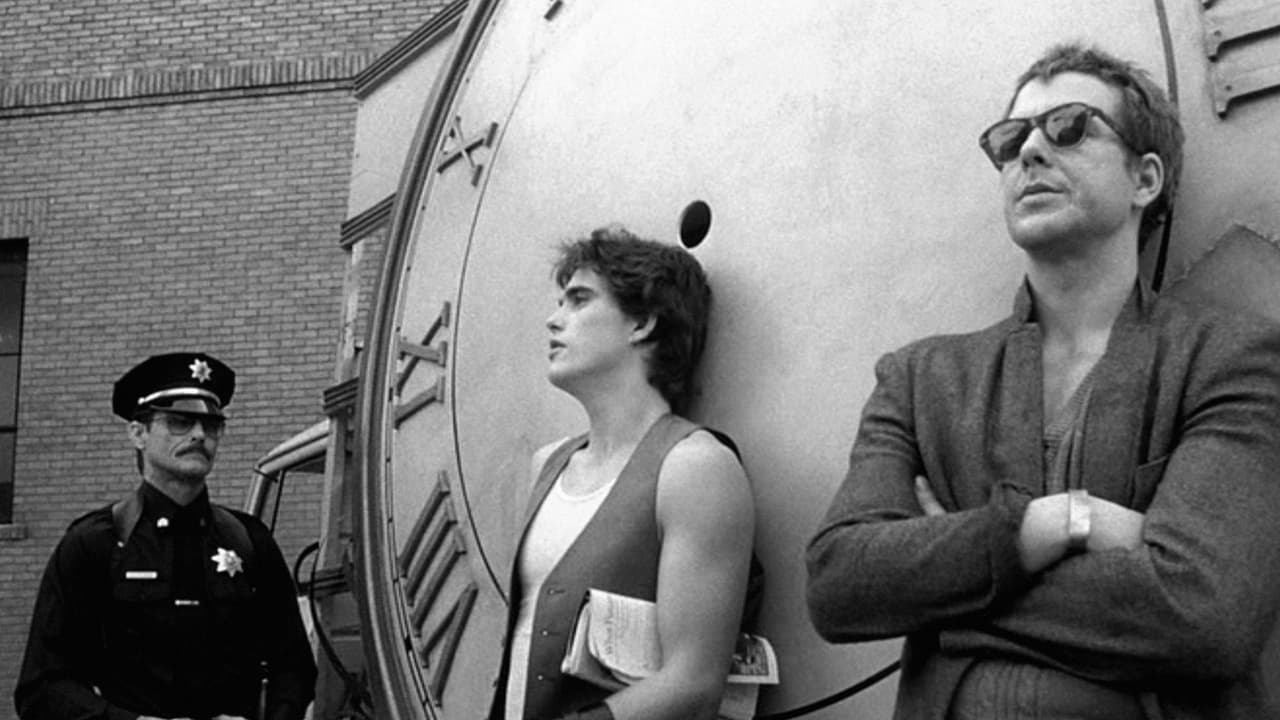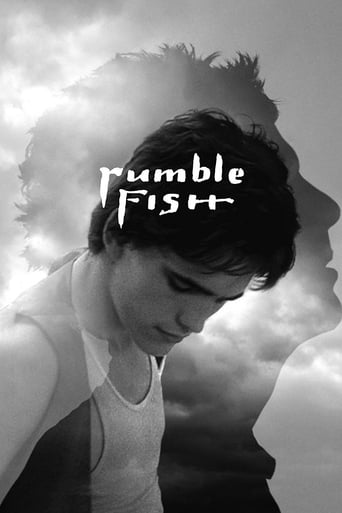Titreenp
SERIOUSLY. This is what the crap Hollywood still puts out?
Softwing
Most undeservingly overhyped movie of all time??
Janae Milner
Easily the biggest piece of Right wing non sense propaganda I ever saw.
Marva-nova
Amazing worth wacthing. So good. Biased but well made with many good points.
tonino mannella
The title manages to perfectly express and synthesize the plot and the meaning of the film. The story unfolds around the figure of Rusty James (Dillon) who metaphorically and literally struggles to be accepted as a leader among the boys in Tulsa (Oklahoma) that fight is countered by the figure of the idyllic brother Motorcycle boy (Rourke) of the young, undisputed boss At the time of the repentant youth bands, returned after a period in California now grown and disillusioned by the dynamics of the small center of the province.During the film there is a symbolic passage of deliveries between the older brother and the smallest who will not be without consequences. They are the rumble fishes that fight in the absence of living space as a fish in front of a mirror. This image, which is presented to us in the fish shop scene, serves to frame Rumble James's rivalry against his brother. The film is stylistically very peculiarly shot in a fake black and white (only 3 significant shots are in color) with shadows and a photograph with strong references to expressionist cinema (blades of light and shadows stretching), The camera is often at the level of the ground by framing the characters from below or taking them to the top, but keeping the depth of field that allows us to keep the attention that happens in the background. The story is told through a multiplication of narrative points: the main one is that of Motorcycle Boy that is color-blind (in fact the film is in black and white), then there is Steve (Spano) who writes everything that happens and the Rusty James point of view through his process of growth and existential harm. The gang- fighting scenes are almost danced, a clear tribute to West Side Story movie. Another feature that affects the eye is the constant presence of moving clouds (representing the timelessness) of the story or the smog, the puff puffs or the fog in almost every scene of the film. All this is marked and rippled by the stunning soundtrack of Stewart Copeland (police drummer) that accentuates the suspense with timid, stingy, stingy whispers, whispers in the background. Inside the soundtrack we also find the beautiful "Don't box me in" (non-casual title) sang by Stan Ridgway. Although the little success at the time of his release has subsequently become a cult film thanks to the cast, which includes, in addition to Dennis Hopper and Tom Waits, a host of young actors who will make Hollywood's fortune from Matt Dillon to Mickey Rourke Vincent Spano, Nicholas Cage and Diane Lane as well as a very young Sofia Coppola.
NateWatchesCoolMovies
Francis Ford Coppola's Rumble Fish is a gorgeous, star studded look at street hoodlums of the 1950s. It's based on the book by S.E. Hinton, who also wrote The Outsiders, which Coppola adapted as well. This one is a bit of a different animal though. Where one might expect a grounded, topical, straightforward script and narrative, we're instead treated to a lyrical, dense and very almost experimental tone. Characters exude archetypal charisma that is stunningly thrown off balance by the poetic, otherworldly dialogue that's at times almost inaccessible, but always mesmerizing. It's as if The Outsiders went to sleep and had a dream, functioning on a similar yet slightly unconscious plane. Once you get accustomed to such an aesthetic, it's a film to draw you in and give you poetic dreams of your own. A young Matt Dillon plays Rusty Ryan, a naive young upstart with dreams of notoriety in the worn doldrums of his neighbourhood. He lives under the intense reputation of his older brother, known only as The Motorcycle Boy (Mickey Rourke). Rourke is at the peak of his moody blues James Dean phase here, and commands the screen with a laid back abandon and smirking charm. He gets romantically involved with angelic local beauty Patty (young Diane Lane, stunning), and deals with his lovable deadbeat father (Dennis Hopper). The scenes between Hopper, Dillon and Rourke has an easy swing to them, and the three have a lived in dynamic that strengthens their characters, individually and as a group. Rourke is under the suspicious eye of robotic, violent local cop Patterson (William Smith), who is just waiting for him to step out of line. Dillon and his thug pals, including Nicolas Cage, Chris Penn and Vincent Spano, daydream their days away pining for the oft talked about days when gang warfare was commonplace. There's a splendid supporting cast including Laurence Fishburne, Sofia Coppola, Diana Scarwid, and Tom Waits, mumbling sweet existential nothing's to himself in the local diner. The film is shot in wistful black and whites, and exists in a realm of heightened emotions where the characters all seem to be a little larger than life, but nevertheless human. There's a surreality to it though, a free flowing, dreamy vibe of Chrome on asphalt, lazy afternoons and long glances at pretty girls in the window.
classicsoncall
Cinematically speaking, "Rumble Fish" is dynamic movie making. The crisp black and white photography, creative use of shadows and camera angles, and effective character portrayals make the film a modern day classic. With it's themes of alienation and loneliness it reminds me of 1971's "The Last Picture Show", a truly depressing movie once you delve into it. This movie also detours into the idea of mental illness for one of it's main characters, The Motorcycle Boy portrayed by Mickey Rourke. There are a number of incidents that take you in that direction, beginning with MB's first appearance on screen when he drives his motorcycle into the street punk getting beat up by brother Rusty James (Matt Dillon). Later on, Father (Dennis Hopper) opines that an acute perception can make you crazy, hinting at MB's outlook on life and how he was affected by seeing their mother out in California while Rusty presumed she was dead.Another surprising element of the story, to me at least, was the treatment of life after death showing Rusty James' spirit floating away after getting clubbed by the street thugs using the tire iron. The idea of one's spirit or ghost being able to observe what's happening around them after death isn't so novel any more, but once again, three decades ago putting this on film was something of a break through. Today there are many accounts of individuals who have experienced these sorts of phenomena.I also liked the idea of tying in the film's black and white style with Motorcycle Boy's color blindness. It allowed for the few brilliant flashes of color that accentuated the movie's title, as the only objects of color were the Siamese fighting fish, the rumble fish. Setting them free was a symbolic way for Motorcycle Boy to show his brother what he had to do to if he was to save himself from the boredom and monotony of his own life. The film is loaded with nuances like this that become more evident with repeat viewings. I watched the picture a couple times back to back and was surprised to acquire so much additional understanding the second time around. It's as if I gained an acute perception of what the writer and director were trying to say without actually going crazy.
alex239-545-53158
There are definite echoes of East Of Eden here, with Matt Dillon playing the insecure, brooding, rebellious James Dean role in the shadow of his brother, with a second parallel being the mysterious back story behind the mother shared by both films. This is actually better in my opinion. More stylish, with unquestionably superior photography and a fantastically distinct art direction which makes it stand out immediately, all monochrome in black and white, with smoky backdrops and a film noir style that perfectly brings to life the 50s youth gang setting. It's also a much more natural film, with the dialogue flowing and not stylized in the least. There are some brilliant lines that fit seamlessly into the normal young conversation, and feel like things people would say in real life. There is a sense of grit and realism alongside the panache, and it strikes the perfect balance in that respect.The two lead actors are magnetic in their roles, and beautifully framed by Coppola. Matt Dillon smoulders in a white vest throughout as Rusty James, brilliantly portraying a compelling juxtaposition between his brash, arrogant teenage exterior and the self destructive tendencies that mask the pain he feels inside from a troubled life. Mickey Rourke as his brother is stiller, more measured, more world weary, and it is a wonderful turn in a career full of high points; his charismatic is instant, and the two actors have a undeniable rapport on screen. Diane Lane is solid in the supporting role and very believable.It isn't quite a perfect film. The constant repetition of Rusty James is beyond annoying, and a real flaw in the script. His full name is said probably over a hundred times in a movie that lasts only ninety minutes – it's clearly deliberate, but it's hard to see why. Other than that the plot might be a bit meandering and aimless for some, although personally I prefer character driven films such as this, which focus on the relationships between the protagonists rather than hurtling through a storyline. The ending is also unsatisfying, quite sudden and nobody really gets what they deserve.Perhaps the biggest compliment you can pay this film is that it is interesting and meaningful but at the same time a pleasure to watch. It succeeds in transporting you back to that time, and you can become totally lost in the movie and its setting. It's also very cool, very stylish and visually flawless. Highly recommended.

